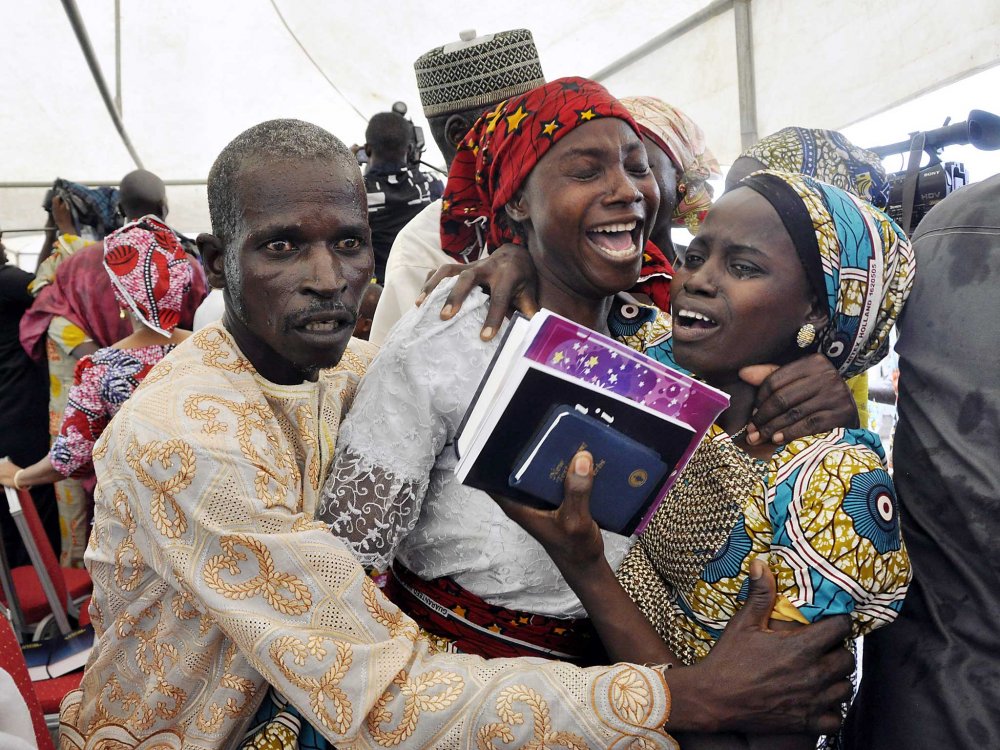Other Pages
- Opinion Poll
- About Us
- Send Your Story
- Contact Us
- Newsletter
- Privacy Policy
- Terms and Conditions

Nigerians woke up to the heartbreaking news of the abduction of 276 schoolgirls between the ages of 16 and 18.
The girls, popularly referred to as 'Chibok Girls' were kidnapped in the early hours of April 15, from their dormitories in a boarding school located in Chibok Local Government Area of Borno State.
Following the incident, about 57 of the schoolgirls were, fortunately, able to escape captivity by jumping out of the moving truck transporting them to the destination that some of the girls would reside for the next 7 years or more.
Shortly after the sad incident, Abubakar Shekau the leader of the Boko Haram Militant Group released a video claiming responsibility for the abduction.
The rest of the girls in captivity were sighted for the first time in a 2nd video that was released by Boko Haram, a week after the 1st. In the video, the abducted girls were dressed in long hijabs.

READ ALSO After Six Years Chibok Students Write WAEC
Local residents were reported to have assisted the military to track the movements of the rest of the students across the northeastern part of Nigeria.
International support was also garnered after the media campaign of #BringBackOurGirls was kick-started to transfix people around the world about the plight of these abducted girls.
READ ALSO: Kankara Abduction: Released Schoolboys Recounts Their Ordeals
Several months or years following the incident, the Nigerian Military Forces were gradually able to secure the release of some of the girls albeit in piecemeal. The lives of some of these girls would never remain the same again as a result of the trauma they suffered while in captivity.
Sometime in 2016, one of the girls, Amina Ali Nkeki was found in the forest by a vigilante group, looking malnourished along with her baby and husband, Mohammad Hayyatu, who was suspected to be a Boko Haram militant. According to report, she was taken to the house of the group's leader who recognized her and reunited her with her parents.
On May 6, 2017, 82 schoolgirls were released from their abductors after a successful negotiation between the Nigerian government and Boko Haram. It was learned the some of the girls were exchanged for the release of five Boko Haram leaders in detention.
Following their release, some of the girls recounted their gruesome ordeal while in captivity, stating that some of the girls were dead already. According to report, the majority of the girls abducted are Christians who were forced to convert to Islam while in captivity.
Some of the content of a diary kept by one of the girls, Naomi Adamu was published in a book, in 2021.
Adamu was one of the girls freed in 2017. She wrote therein how the girls were compelled to take compulsory lessons on the Quran, how they were regularly beaten with rifle butts, rope, and wire but were not forced to marry their abductors or sexually abused. She led a group of resistant girls who refused to convert to Islam, who were threatened with death and starvation by the militants.
Most of the released girls were enrolled into the American University of Nigeria to continue with their studies. A therapist was also hired to look after their mental wellbeing.

According to a report in 2018, one Ali Garga, a Boko Haram militant, offered to free 40 more of the Chibok schoolgirls. However, he was tortured and killed by other Boko Haram members when they found out what he wanted to do.
In January 2021, almost 7 years after, it was reported that an unknown number of girls escaped captivity.

In an interview with CNN, one of the fathers of the girls who recently escaped said he received a call from his daughter Halima Ali Maiyanga, informing him that she has managed to escape from her Boko Haram abductors.
According to CNN, Ali Maiyanga said;
"She asked me. Is this my daddy? Is this my daddy, and she started crying. The crying was so much and I couldn't hear her very well. I was crying too. I never expected to hear from her again.
"The whole family is so happy. Our house is full of people who are rejoicing with us."
Ali Maiyanga said he didn't get a chance to speak to his daughter properly, as she was emotional and the call was short. But he said she and others are safe and being looked after by the Nigerian army.
The kind of trauma the Maiyanga family would have gone through, not knowing the fate of his daughter can only be imagined.
Exactly seven years after the event of April 14/15, 57 of the girls were able to escape,107 girls have been freed, while 112 of them are yet to be accounted for, whether dead or alive.
Seven years ago, none of the girls nor their families would have imagined the traumatic turn their lives were about to take as a result of the security failure of the Nigerian Government.
What is more sad is that a repeat of the event has happened on two other occasions, where a large number of school girls have been kidnapped by Boko Haram.
READ ALSO Like Chibok, Like Dapchi, Like Jangebe: Will The Girls Left Behind Ever Be Free?
Till date, insecurity still remains a major challenge in Nigeria, with the constant battle with the menaces of Boko Haram, Banditry, Herdsmen, and kidnappings among others.
0 Comment(s)